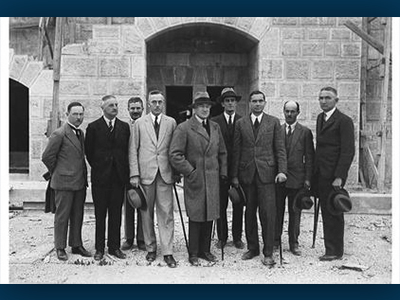January 17, 1930
Sir John Chancellor was the third British high commissioner in Palestine. He served from 1928 to 1931 and had no particular views for or against Zionists or Arabs when he began his tenure. While he was high commissioner, he faced major riots in August 1928 and August 1929. In addition, major British investigatory reports were commissioned and written to look into the economic and political causes of these disturbances. These reports pinned responsibility for the unrest on a wretchedly impoverished Palestinian Arab rural economy, Arab incredulity for allowing Zionism to grow (Jewish land purchases and Jewish immigration), Jewish population growth, fragmented Arab leadership, and the unyielding Zionist drive to build a national home.
Britain issued the Passfield White Paper, reflecting the intention to slow Jewish population growth, in October 1930. That White Paper was rescinded and virtually not enforced.
Greatly influencing these (Shaw and Hope-Simpson) reports and the issuance of the White Paper were John Chancellor’s growing anti-Zionist views. He expressed them in this dispatch to the Colonial Office on January 17, 1930. Some 90 pages in length, it is the longest known dispatch written by a high-ranking British official to enumerate why the Arabs in Palestine were so vexed. The contents of the dispatch are a succinct and pointed brief of Arab grievances toward the Zionists and British policies and a call to stop the Jewish national home. The dispatch was drafted not by Chancellor, but by several British officials deeply familiar with the history and nuances of the emerging Arab-Zionist confrontation in Palestine, all of whom held the pronounced view that the Jewish national home must be halted to avoid further violence.
In the dispatch, Chancellor outlines in great detail why Arabs in Palestine have grievances and why restrictions on Jewish land purchase and immigration are necessary. Short of stopping Zionist growth in the 1930s, Chancellor’s ideas spawned the British application of dozens of laws and regulations in the early 1930s aimed at keeping Arab peasanta on the land, away from being displaced by Arab land sales and Jewish purchases. Legislation and restrictions against Jewish growth would not be fully implemented in the 1930s; nonetheless, they were eventually applied in a draconian fashion against the Zionists in the 1939 White Paper. By then, a Jewish national home could not be stopped, only its pace slowed and contours restricted.
Chancellor’s intentions scare the Zionists sufficiently that they reorganize their land settlement and immigration programs in the early 1930s; they now focus on creating consolidated and contiguous Jewish land enclaves. Hopeful that Chancellor’s views will be upheld by the Colonial Office, Palestinian Arab political leaders are dismayed at a promise to help them that faded as quickly as it had appeared. Despite Chancellor’s dispatch and views, the growth of the Jewish national home marches forward.









